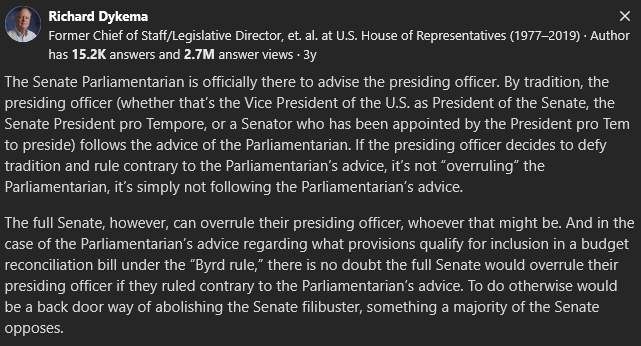Last week Senate Parliamentarian Elizabeth MacDonough submerged the House-passed Big Beautiful Bill in the Byrd Bath and ruled that numerous major cost cutting provisions are ineligible to be included if the GOP intends to pass the legislation using the reconciliation process. Of course, as a result the Left brags that Senate Democrats are “fighting back” and have ”stopped [the GOP’s] relentless attack on middle class families in order to fund tax breaks for billionaires — a slap in the face to working families everywhere.”
The legislation, in whatever final form the Senate approves, must still be reconciled with the already approved House measure, and many House Republicans insist they will not ultimately vote for a significantly-changed bill. Senate Republicans vow that President Trump will have the bill on his desk for signature by July 4 Independence Day.
Process-wise, you’d be interested to know the Senate Parliamentarian is appointed by and serves at the pleasure of the Senate Majority Leader, which means that Republican Senator John Thune could remove the Parliamentarian. The last time that happened, though, was back in 2001 when Republican Senate Majority Leader Trent Lott of Mississippi fired Parliamentarian Robert Dove following Dove’s rulings against that year’s GOP budget reconciliation legislation. Hmnnn
The long (partial) list below of ineligible items from the Senate version of the budget bill makes it clear Congress will need to pass several other bills and legislation to fully codify President Trump’s agenda items as well as DOGE-revealed waste, fraud, and abuse:
House-passed provisions that limit judges' authority to issue preliminary injunctions blocking federal policies unless the party suing posts a bond to cover the government's costs if the ruling is later overturned (a way to limit nation-wide district court injunctions)
$6.4 billion in cuts to the Consumer Financial Protection Bureau (CFPB) that would have eliminated the agency
$1.4 billion in cuts to Federal Reserve staff pay
$293 million in funding cuts to the Office of Financial Research
$771 million in cuts that eliminate the Public Company Accounting Oversight Board
provisions that that bar illegals from receiving SNAP food assistance
provisions that require states to pay 5 to 15% of SNAP benefits depending on their error rate in processing SNAP (would have placed a significant percentage of the cost onto states) — an area where Senator John Boozman’s Agriculture Committee played a significant role. UPDATE: On 6/24/25 Boozman said the problem was that the cost-sharing provisions beginning in 2028 wouldn’t give states enough time to properly calculate error/match rates, so now this provision is apparently back on with states allowed to use fiscal 2025 or 2026 to determine those figures.
extending the suspension of permanent price support authority (in the past was always part of the farm bill, another of the Senate Agriculture Committee’s main work products that is still in Congressional limbo)
provisions that would create a framework for the sale of federal lands. UPDATE: Republican Senator Mike Lee of Utah will try again by reworking his original, deleted proposal that required the sale of two million acres of Bureau of Land Management/Forest Service land in 11 Western states.
increasing the Federal Employees Retirement System contribution rate for new civil servants who refuse to become at-will employees
language giving states the authority to conduct border security and immigration enforcement
provisions that force the General Service Administration to sell all the electric vehicles used by the U.S. Postal Service (but a policy that would rescind funds passed by Democrats to allow the Postal Service to purchase extra electric vehicles and charges remains)
some sections that loosen or remove Environmental Protection Agency (EPA) regulations, including one that restricts air pollution emissions from passenger vehicles
language from the National Environmental Policy Act to allow project developers to fast-track environmental reviews or prevent judicial reviews if they paid a one-time fee
a modified version of the REINS Act that would have required Congress to approve proposed agency actions before they take effect, a “slimmed-down version” of Republican Senator Mike Lee’s REINS Act aimed at revenue-increasing policies and review of past agency-approved rules to “allow DOGE to be more successful”
What's the Byrd Bath?
A process where the Senate Parliamentarian determines which provisions of a reconciliation bill comply with the Byrd Rule, which restricts what can be included based on budgetary impact. Any item that "significantly impacts the budget" cannot be included; otherwise the legislation cannot pass with a simple majority and would require a 60-vote Senate majority to be approved. Named after Senate Majority Leader Robert Byrd, D-W.Va, the longest-serving Senator in history, who died in 2010.
Who Decides in the Senate?
The Vice President, acting in his role as the presiding officer of the Senate, can rule on Byrd Rule points of order and decide whether provisions are kept or cut. The Senate Parliamentarian is simply an advisor to the Vice President in that process. If the Senate’s presiding officer does not follow the Parliamentarian’s advice, it’s not considered “overruling” the Parliamentarian, “it’s simply not following the Parliamentarian’s advice.” Because the Senate follows standard parliamentary procedure in general, that body then can pursue other procedures to accomplish its intended goals.





